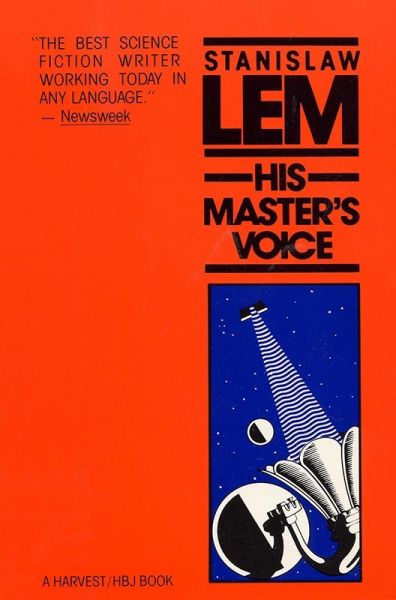The Listeners
His Master’s Voice
By Stanislaw Lem

6 Apr, 2022
Stanislaw Lem’s 1968 His Master’s Voice (Głos Pana) is a stand-alone first-contact novel. The 1983 English edition is by Michael Kandel.
His Master’s Voice is Professor Peter E. Hogarth’s posthumously-published account of the His Master’s Voice (HMV) project. Neutrino-based telescopy offered the chance to unravel nature’s secrets. Alien signals were an unexpected bonus. Mathematician Hogarth was merely one of many experts recruited to decipher the message.
It is not immediately clear if the supposed signal is actually the communication HMV hopes that it is, or merely a natural phenomenon whose nature has been misunderstood. Nevertheless, the Pentagon is very hopeful that somewhere out in the vast gulfs of space,
- some far more advantaged civilization has broadcast a deliberate message,
- that the army of experts assembled in Nevada will be able to decipher it,
- and that the contents will be useful to mankind or more exactly, that fraction of humanity to which the Pentagon answers.
Hogarth brings to the project prodigious skills that are inextricably coupled to a tendency to overthink any problem (or as he would probably have put it, examine any challenge from every possible angle, not merely those convenient to his employers). Thus, his account of HMV is dense and highly detailed. Furthermore, being relentlessly honest, he is willing to consider the possibility that even if the signal is a message, it might not simply be unknown but unknowable.
Inscrutability does not preclude the experts from producing tangible results. But who can say whether their creations were inherent in the signal or whether they are merely some sort of technological Rorschach test. What is clear is that the discovery could well tip the balance of terror into a brief and final nuclear exchange.
~oOo~
Lem is quite aware of the venerable trope that SFdom is to be consulted when a government is confronted by the astonishing. It will not astound those familiar with Lem’s views that he is quite skeptical that the galaxy of possibilities offered by SF’s weird tales are shaped by any real insights rather than by commercial demands and authorial laziness. In his view, SF is unlikely to be of much use at exploring the new worlds hinted at by the signal.
His Master’s Voice is quite short, about two-hundred pages. Nevertheless, Lem’s novel is a densely packed narrative touching on a wide variety of subjects. Other authors might have squeezed an entire series out of this slender volume.
Fans of conventional SF should know that Lem (or at least his protagonist) is fonder of questions than answers. There are many competing explanations for the signal and readers will never learn which (in the author’s estimation) is correct.
As I do not speak or read Polish, I cannot attest to the accuracy of the translation. Or to the extent to which Kandel was able to find English analogs for Polish word play. I can only state that his translation was entirely successful in that it was not only readable but absorbing (a major feat when faced with two-hundred pages of inconclusive philosophical musings).
Well, I’ll backtrack a bit; although His Master’s Voice is a good read, it isn’t an easy one. It’s a book for the right reader. It may also frustrate readers who want easy answers about CETI [1]. But give it a try; you may find yourself racing through it.
His Master’s Voice is available here (Amazon US), here (Amazon Canada), here (Amazon UK), here (Barnes & Noble), here (Book Depository), and here (Chapters-Indigo).
1: Note to self: compare and contrast with The Hercules Text when that comes up for review in a month or so….
